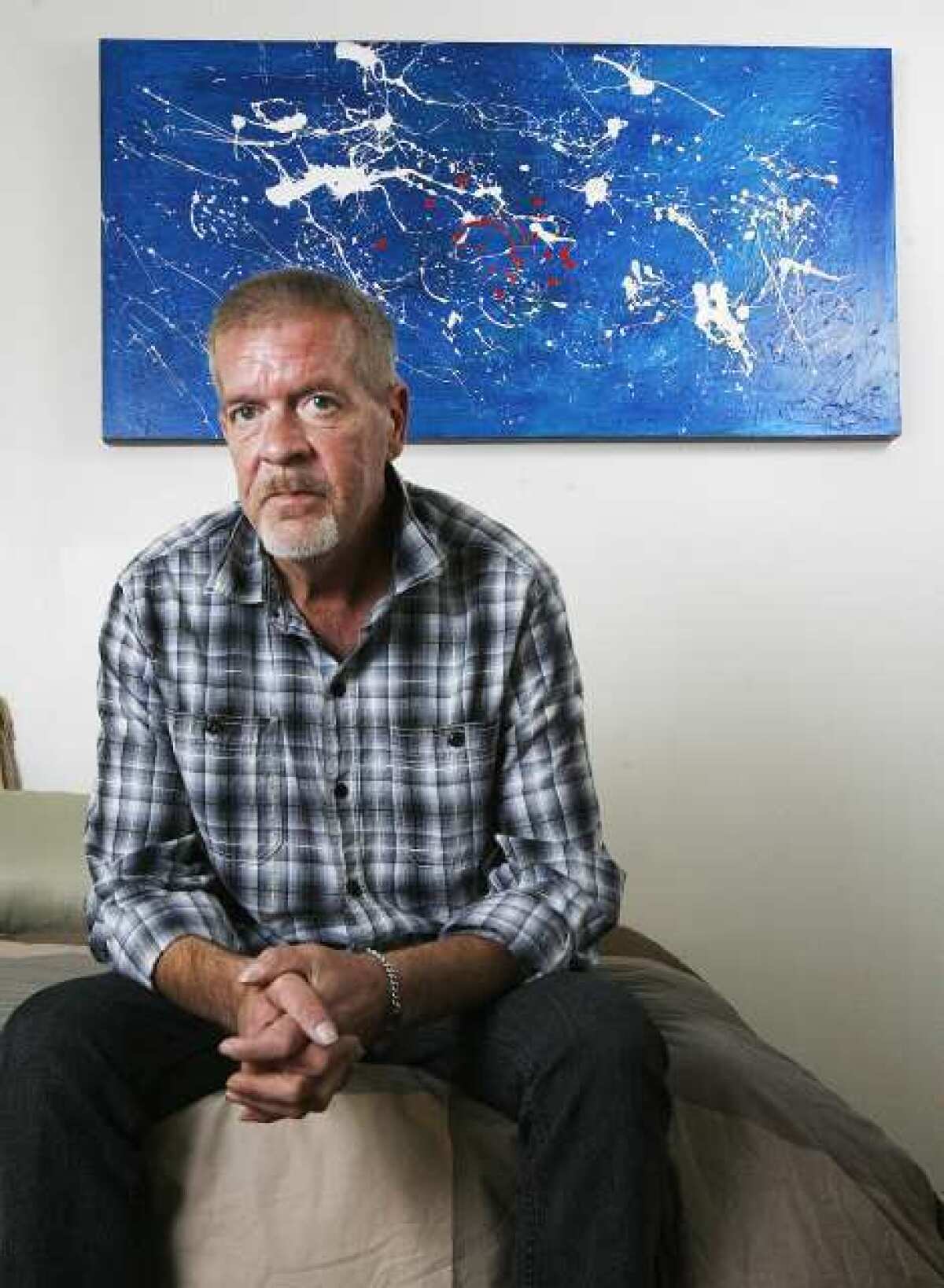Homeless no more

- Share via
After losing his job and getting evicted, Lanny Allen spent one of his first nights on Glendale streets covered in bubble wrap to keep warm.
That evening, a homeless man recognized him as the insurance investigator who had bought him lunch when he was hungry. He gave Allen a coat and showed him how to live outdoors.
Allen spent the next 10 years on the streets. He slept in Chess Park back when it was an empty alleyway across from the Alex Theatre until he was beaten by a group of teens. He stayed in the Hollywood Production Center when it was vacant until his “roommate” tried to choke him.
Then he lived in an abandoned restaurant until police found him drunk and “in bad shape.”
That night, four years ago, was when Allen, a veteran who worked in military intelligence during the Cold War, first met Mark Horvath, a homeless advocate who works for Ascencia, Glendale’s largest homeless services provider, which helped him find permanent housing.
Last month, he got the keys to a studio apartment in South Glendale — a formidable feat until a recent influx of federal money flowed in, targeted at ending veteran homelessness by 2015.
“I’m acclimating myself to becoming indoors again after so long,” said Allen, who now has a habit of feeling for his keys in his pockets. “It takes getting used to.”
With the federal focus on veterans, Ascencia set a goal to end veteran homelessness in Glendale by June. But that deadline came and went, and although the nonprofit has housed 23 veterans since May 2011, others are out there.
That’s more due to a change of course, though, than a lack of resources.
Last year, during a survey of homeless people in Glendale, Ascencia found seven veterans, but when they searched for them again, some went missing, while others turned out to be from other countries, making them ineligible for federal help.
So Ascencia made it an open list, hoping to capture any missed veterans.
“One of the hazards of having an updated list is it does become a never-ending problem,” said Ascencia Executive Director Natalie Profant Komuro.
Three homeless veterans are left on the list. Two have jobs, none has a home, and one has difficulties accepting help.
“If by the end of the year we have two people on the list, we can say, ‘Geez, that’s pretty phenomenal,’” Profant Komuro said.
Ascencia uses a mix of federal grants through the Department of Veterans Affairs and city of Glendale to house veterans.
Allen was a beneficiary of about $160,000 Glendale received from the Department of Housing and Urban Development this year to house three to five homeless people. His rent is $50 a month, or 30% of his income, which comes from the Los Angeles County Department of Public Social Services.
The housing department subsidy pays for the majority of rent indefinitely until economic status changes, disabilities disappear, or if federal funding is cut — a very real possibility if Congress can’t avoid the “fiscal cliff” looming in January.
The subsidy covers monthly rents up to $961 for studios and $1,159 for one-bedrooms in Los Angeles County. The costs may be high, but it would be more costly to leave people like Allen on the streets racking up hospital bills, Profant Komuro said.
Veterans Affairs subsidies, though, backed by hundreds of millions of dollars, are the primary resource used to house veterans in Glendale.
“The VA can’t end homelessness alone. It has to do it in the community with the community,” said Vincent Kane, director of the agency’s center on homelessness among veterans.
Allen spent some time living at a Veterans Affairs shelter in Los Angeles, but when he was to be transferred to Long Beach earlier this year, he left.
He returned to Glendale, where he knew the streets and the people living on them.
Horvath found him once again, and after filling out stacks of paperwork, the housing search began anew.
While Allen suffered from chronic homelessness, there’s also a new effort to aid veterans who are on the brink. At $300 million, prevention grants for 2013 have increased threefold, Kane said.
But with more money comes more competition. Nearly 700 agencies are expected to apply for grants, nearly double the last number.
Ascencia is one of them.
The application process has been simplified, but Horvath said red tape remains.
“You have to fight to get everything,” he said.
The federal goal is on track, with the number of homeless veterans dropping 12% to about 67,495, Kane said. As for Glendale, the number of homeless people fell 60% to 15 in 2012 during a one-night count in January compared with the previous year, or 5% of the overall homeless population.
Glendale’s veteran homeless range from 39 to 66 years old. Allen is 52.
Despite the drops, poverty among post-9/11 veterans in Los Angeles County is on the rise. Between 2006 and 2010, their poverty rate increased from 4% to just under 12%, according to a United Way of Greater Los Angeles report released this week.
Last week, as Superstorm Sandy pummeled the East Coast, Allen watched the disaster destroy people’s homes on a donated television.
“I broke down and cried. It was guilt, survivor guilt,” he said.
Follow Brittany Levine on Google+ and on Twitter: @brittanylevine.